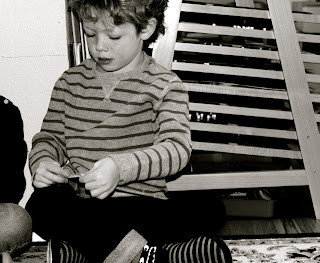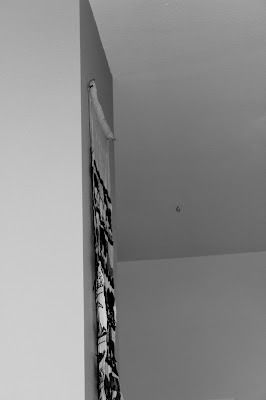The studio hums with children busy at work. They’ve completed paintings of their favorite animals and are busy building an elaborate city of blocks. Building the city leads to an excited conversation about their latest big idea, a diorama. After some preliminary discussion they include me in the conversation. “You know what a diorama is Angelina, right? It’s something you can only make in first grade.” Another child remarks, “Yeah my brother made one of those!!!” I respond, “You don’t have to wait until the first grade, we can make a diorama anytime.” The children chorus, “Let’s make dioramas!” and eagerly begin discussing interests.
The speed of child dialog is dizzying and certainly not limited to the Studio. It is ever-present on the playground as they engage in imaginative play of all sorts. In the classroom, they bring their work to each other and their teachers. “Look, Angelina. I wrote an ‘a’, see right here, that’s an ‘a’”. Why all the conversation? Do they need praise? Is this a product of the pandemic? For a while, I’m baffled as I try to understand what might be going on. Eventually I remember to pay attention and trust the children.
The past two years have caught us up in a rush of doing and pushing in an attempt to find our way back to ‘normal’. COVID and our responses to it have changed the face of our communities, schools and society. Every day, our classrooms have a revolving door of students as families adapt to COVID cases and exposures. The strain of constantly pivoting to keep ourselves and each other safe has us all feeling out-of-sorts, off balance, and disconnected. As adults, this is difficult enough. Unfortunately, the impact doesn’t stop with us.
Our children, adolescents, and young adults are experiencing an unprecedented mental health crisis. The US Surgeon General recently issued a health advisory to say that young people in this country have experienced a 40% increase in feelings of sadness and hopelessness compared to ten years ago. This isn’t something new. A mental health epidemic had been identified before 2020. Unfortunately, it has not improved! Depression rates among young people have doubled in the past two years. Pediatric psych units are at capacity. The entire mental health system is stretched beyond its reach.
While the pandemic isn’t our norm, it is the norm for many of the youngest members of our community. Here at Children’s Garden, our oldest students have been in the pandemic for half of their lives. We mustn’t overlook that. The children will always remind us what is important. As they reach out with their constant chatter and demands for attention, they are seeking connection. They are building relationships. Relationships with their teachers, with one another, with families, with everything. Of course a pandemic has had a very real effect on all of us and I know there is a concern about academic preparedness nationwide. But if we think the children are falling behind and rush past their fundamental need for social and emotional development we do the children a big disservice. This isn’t business as usual. Not for any of us. And if learning is expected to continue as planned we will miss some essential childhood needs.
The Harvard Grant study, published in 2017, revealed that healthy relationships are more important predictors of longevity and well being over time than exercise, genetics and diet combined. We know social connection is a powerful buffer to stress and a source of wellbeing, for children and adults. All too often, in our fast-paced lives, quality time with people gets crowded out. Our children need time to reconnect, collaborate, play, chat, wander, make meaningful mischief, mess about and discover. Prioritizing relationships, child to child, adult to child and even modeling healthy adult to adult relationships, IS the best proven way to promote mental health into adulthood.
This brings us to the importance of social emotional development and relationship building amongst the children in our care. We must tailor their education to meet these new needs. Of course we will always ensure that your children are getting a well rounded and deeply meaningful learning experience. That is what our little school is known for. And as we continue to respond to the needs of children, it is more important than ever to allow the children ample opportunities to practice building relationships and hone emerging social and emotional skills.
I have many ideas about how we can work together to help our children build healthy relationships AND I am eager to hear some of yours. On January 27 at 6PM MST, you are invited to join me, and Bekke Howell, Head of School, in an open discussion. We will share what the teachers do at school and ideas for what parents might do outside of school to support social/emotional development in the weeks and years ahead. And as always we welcome your voice to further the conversation.
I look forward to seeing you there!
Your Studio Teacher,
Angelina












